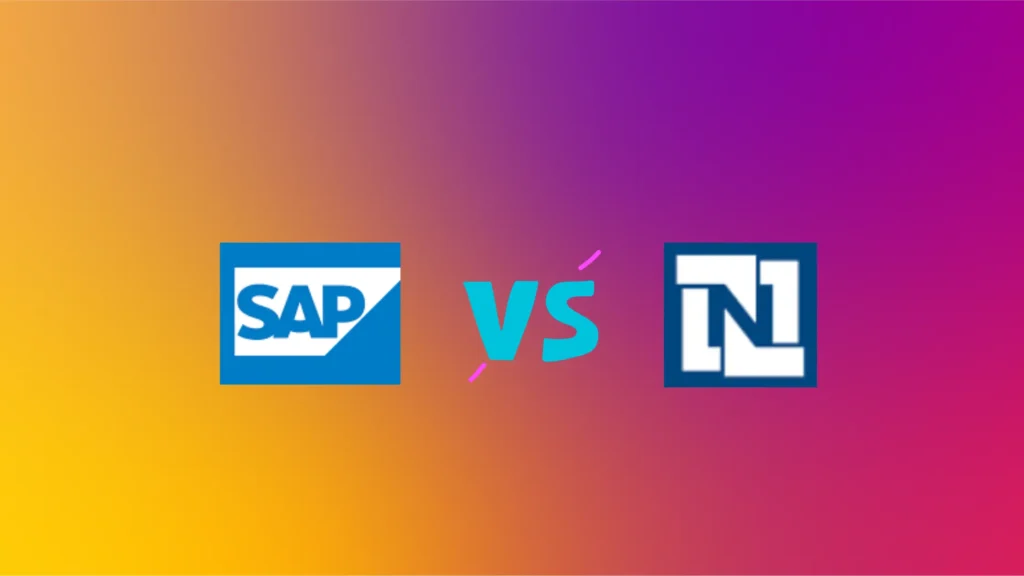In today’s competitive business landscape, having the right software is essential to staying ahead of the curve. Two popular software options that businesses often consider are SAP and NetSuite. Both are well-known enterprise resource planning (ERP) solutions with unique features and advantages. In this article, we’ll compare SAP and NetSuite, which will help decide which is best.
What is SAP?
SAP is a software solution that provides end-to-end business processes for various industries, such as manufacturing, finance, supply chain, sales, and more. It offers multiple modules to address different areas of business management. SAP is a popular choice for large businesses, with a robust set of features and customizability that allows companies to tailor the software to their specific needs.
What is NetSuite?
NetSuite is a cloud-based software solution that provides enterprise resource planning, customer relationship management, and e-commerce capabilities. It is known for its user-friendly interface, flexibility, and scalability. NetSuite is a popular choice for small to mid-sized businesses looking for a software solution that can grow with them.
Comparison of SAP vs. NetSuite
Now, let’s compare the two software solutions based on various criteria:
Customizability and Integration
SAP offers high customizability levels, allowing companies to tailor the software to their specific business processes. SAP also has a robust ecosystem of third-party applications and services that can be integrated into the system. However, customization requires significant time and resources, and businesses may need to hire SAP consultants to help with the process.
NetSuite also offers customization, but to a lesser degree than SAP. Its more straightforward interface makes it easier for users to make changes independently. NetSuite’s cloud-based platform allows for easy integration with other cloud-based solutions, which makes it an ideal solution for companies that need to connect their software systems.
Cost
SAP is known for being expensive, especially for small to mid-sized businesses. The cost of SAP includes licensing fees, hardware costs, consulting fees, and ongoing maintenance costs. The total cost of ownership of SAP can add up quickly, making it unaffordable for some businesses.
On the other hand, NetSuite has a more affordable pricing model, with a monthly subscription fee based on the number of users and modules. NetSuite’s cloud-based platform eliminates the need for expensive hardware; the software updates are included in the subscription cost.
Scalability
SAP is highly scalable and perfect for large enterprises with complex business processes. It offers various modules that can be added or removed based on the company’s needs. However, the customizability of SAP can make scalability challenging and time-consuming.
NetSuite is also highly scalable, with a modular design allows businesses to add or remove features as needed. NetSuite’s cloud-based platform makes it easy to scale up or down as the business grows or changes.
User-Friendliness
SAP has a steep learning curve, and users often need extensive training to use the software effectively. The interface can be overwhelming, and navigating the various modules and features can take time.
NetSuite is known for its user-friendly interface, with a simple design that makes it easy for users to navigate the software. The platform is designed with the end-user in mind, and most users can start using the software with minimal training.
Functionality
SAP offers a robust set of features that can address various business processes. It provides advanced reporting and analytics capabilities, which can help companies gain insights into their operations. SAP’s customizability also allows for the creation of custom reports and workflows.
NetSuite offers comprehensive features, including ERP, CRM, and e-commerce capabilities. While not as robust as SAP’s feature set, NetSuite provides a range of functionality that can meet the needs of most businesses. NetSuite’s complete CRM module offers a range of features that allow companies to manage their customer interactions and sales processes effectively.
Support and Maintenance
SAP requires a dedicated IT team to manage the software and handle any issues. Businesses may also need to hire SAP consultants for support and maintenance. SAP offers various support packages, including phone and email support, but these can be costly.
NetSuite offers support through its customer service team, which can be accessed via phone, email, or live chat. NetSuite’s cloud-based platform also eliminates the need for businesses to manage their own hardware and software maintenance, which can save time and resources.
Which software is best for your business?
Choosing between SAP and NetSuite ultimately comes down to the needs of your business. SAP is a robust solution accommodating complex business processes and large enterprises. However, its customizability and cost may make it unaffordable for small to mid-sized companies.
On the other hand, NetSuite is a more affordable and scalable solution well-suited for small to mid-sized businesses. Its cloud-based platform makes integrating with other software systems accessible, and its user-friendly interface can help companies to get up and running quickly.
In conclusion, SAP and NetSuite are excellent software solutions with strengths and weaknesses. Consider your business’s specific needs and requirements when choosing between these two software solutions. It may also be helpful to consult an ERP consultant or software expert to determine which solution is best for your business.
